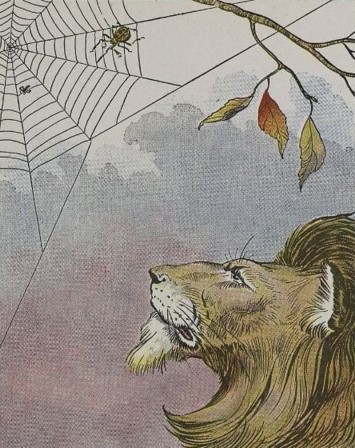PART A_1
Let’s learn vocabulary. Listen and repeat the words and the sentences with your tutor.
PART A_2
| 1. vile | /vahyl/ |
| -unpleasant, immoral, and unacceptable | |
| The guest’s humor is vile. | |
| 2. instant | /IN-stuhnt/ |
| -happening immediately, without any delay | |
| The soldier acted in an instant. | |
| 3. rage | /reyj/ |
| -(a period of) extreme or violent anger | |
| Their speech was full of rage. | |
| 4. pride | /prahyd/ |
| -a feeling of deep pleasure or satisfaction derived from one’s own achievements | |
| He took pride in a job well done and always gave full commitment to any job he undertook. | |
| 5. fierce | /feers/ |
| -physically violent and frightening | |
| The fierce animals attacked the travelers. |
PART B_1
Let’s read the story. Please read them aloud, and I will check your pronunciation and intonation.
PART B_2
The Lion and the Gnat

“Away with you, vile insect!” said a Lion angrily to a Gnat that was buzzing around his head. But the Gnat was not in the least disturbed.
“Do you think,” he said spitefully to the Lion, “that I am afraid of you because they call you king?”
“Do you think,” he said spitefully to the Lion, “that I am afraid of you because they call you king?”
The next instant he flew at the Lion and stung him sharply on the nose. Mad with rage, the Lion struck fiercely at the Gnat, but only succeeded in tearing himself with his claws. Again and again the Gnat stung the Lion, who now was roaring terribly. At last, worn out with rage and covered with wounds that his own teeth and claws had made, the Lion gave up the fight.
The Gnat buzzed away to tell the whole world about his victory, but instead he flew straight into a spider’s web. And there, he who had defeated the King of beasts came to a miserable end, the prey of a little spider.”
The least of our enemies is often the most to be feared. Pride over a success should not throw us off our guard.
PART C_1
Let’s answer comprehension questions. Please answer them based on the story.
PART C_2
| 1. | Why did the Gnat sting the Lion? |
| 2. | What happened to the Gnat after defeating the Lion? |
| 3. | What caused the death of the Gnat? |
PART D_1
Let’s discuss the story. Please answer the questions below and express your opinions.
PART D_2
| 1. | How do you understand the lesson of the fable, “The least of our enemies is often the most to be feared”? |
| 2. | What do you think is the importance of humility? |
| 3. | How can you apply fable’s lesson, “Pride over a success should not throw us off our guard” in your life? |
| 4. | Why do you think some people grow with too much pride? |
| 5. | Cite and explain a situation similar to the fable’s lesson. |
REVIEW AND FEEDBACK
Now, let us review the things that you learned in this lesson.
ではこのレッスンで学んだことを振り返りましょう。
(Please give a short feedback on how your student did on your class.)
| Grammar 文法 |
Pronunciation 発音 | Vocabulary 単語 |
Comprehension 理解 |
|
|---|---|---|---|---|
 GOOD GOOD |
文法の誤りはほとんどなく、完全な文章で話すことができる | ほとんどの単語をはっきりと正しく発音することができる | 習った表現を適切に使うことができる | 文章を理解し、質問に正しく答えることができる |
 FAIR |
文法の誤りはあるが、完全な文章で話すことができる | 発音の練習が必要な言葉がいくつかある | たまにミスはあるが、習った表現を適切に使うことができる | 文章を完全に理解するのは難しく、質問に正しく答えられないときもある |
 POOR |
文章で話すのは難しく、単語だけで話すことができる | 発音の練習が必要である | 習った単語と表現を少しだけ使うことができる | 文章を理解するのは難しく、質問に答えるのは難しい |
Parts of this lesson material are based on:
An eBook from The Project Gutenberg.
This eBook is for the use of anyone anywhere at no cost and with almost no restrictions whatsoever. You may copy it, give it away or re-use it under the terms of the Project Gutenberg License included with this eBook or online at www.gutenberg.org
An eBook from The Project Gutenberg.
This eBook is for the use of anyone anywhere at no cost and with almost no restrictions whatsoever. You may copy it, give it away or re-use it under the terms of the Project Gutenberg License included with this eBook or online at www.gutenberg.org